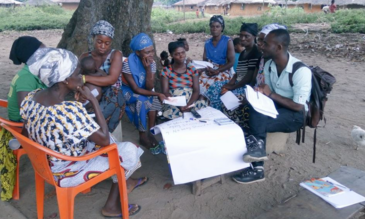
COUNTDOWN Liberia is using a health systems research approach to focus on implementation research questions identified by practitioners working on NTD control. Implementation research questions are geared toward achieving effective integration and scale-up of NTD control and elimination activities in Liberia, as well as providing key lesson learning for, and knowledge sharing across, the three other COUNTDOWN countries (Nigeria, Ghana and Cameroon).
Focus Area One: Increasing community ownership of mass drug administration programmes for preventive chemotherapy diseases in Liberia. The research will aim to understand what strategies could be used to increase community ownership and participation within mass drug administration (MDA) strategies for Lymphatic Filariasis, Onchocerciasis, Schistosomiasis and Soil Transmitted Helminths. This study phase is designed to take place alongside combined mass drug administration for LF, onchocerciasis and STH. This should offer better understanding of how MDA strategies are currently implemented and how this aligns to planned systems delivery. The expected outcome will be increased understanding of how the NTD programme can be better communicated to increase community participation and social mobilisation. This should allow for the development of recommendations for effective programme delivery.
Focus Area Two: Understanding NTD health workforce experience of NTD programme delivery with specific focus on motivation, supervision, and incentives and their implications for programme sustainability. The aim of this sub-study is to identify potential strategies to improve the way NTD health staff at the county, district and community level are trained, motivated, supervised and incentivised. The expected outcome is to increase understanding of community perceptions and understandings of the NTD programme including knowledge of reasons why the programme is rejected or not fully engaged with.
Understanding planning constraints to the co-implementation and integration of the NTD programme with other health systems activities should improve understanding on how existing community structures are utilised in the selection of community drug distributors; how this varies based on geographic location and cultural or religious values, and how such structures could be better utilised.
